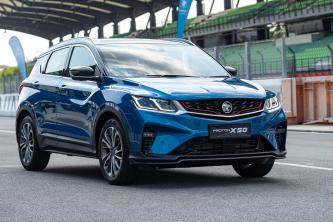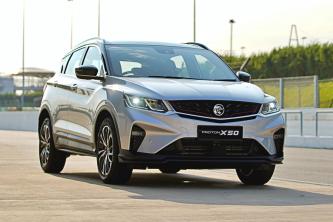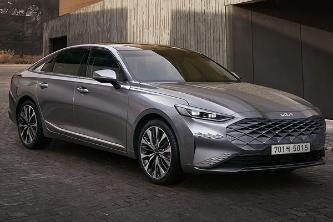direct injection rattle
Artikel Terkait direct injection rattle

700 km in one full 45-litre tank for the 2020 Proton X50 1.5 TGDI
Because the 1.5 TGDI engine uses direct injection while the 1.5T MPI engine uses port injection.We also
Does the all-new 2019 Subaru Forester 2.0L feel underpowered?
components along with more modern technologies to keep the engine competitive.For starters, it now features direct
More 3-cylinder turbocharged Proton models coming – 1.5T MPI to be rolled out further
The next generation of Proton models will use three-cylinder turbocharged 1.5-litre port injection (MPI
2020 Proton X50 previewed for Malaysia: Two engines – 150 PS & 177 PS, bookings open 16 Sep
starters, Proton will offer the X50 with two powertrain options.The first is a 1.5-litre multi-port injection
Lynk & Co 02 Hatchback is Geely’s answer to the VW Golf GTI; 254 PS/350 Nm, 8AT
its sedan sibling, the Lynk & Co 03+.The Lynk & Co 02 Hatchback gets a 2.0-litre turbocharged direct
Geely-Volvo: RON95 is enough for your Proton X50, RON97 won’t add more power
The first is a multi-point injection (MPI) engine that does 150 PS and 226 Nm, while the second engine
Sorry, we made a mistake. All 2020 Proton X50 1.5 will be 3-cylinders, no 4-cylinders
Our earlier reports that indicates the 1.5-litre multi-port injection turbo engine is a 4-cylinder unit
All-new 2021 Subaru Levorg recognised as the best car to come out of Japan this year
Platform that “provides a high level of both maneuverability and comfort”, the newly developed direct
The new 2020 Honda Civic FC facelift looks best in Passion Red Pearl colour
from RM 113,600 to RM 139,600, available in three variants and two engine options - a 1.8-litre port injection
2020 Proton X50 launch date confirmed - 27 Oct, livestream via Facebook
The first is a multipoint fuel injection unit that does 150 PS and 226 Nm, while the second is a direct
Volvo XC40 PHEV confirmed for Malaysian launch on 25 February
document, script, facebook-jssdk)); The XC40s powertrain will be made up of a 3-cylinder turbocharged direct-injection
What’s the Proton X50’s tested fuel consumption?
but a good all-rounderTo recap, all variants but the Flagship are powered by a 1.5-litre multi-point injection
First week with the Perodua Ativa - Something is rattling
There’s a rather distinct rattle coming from the back when driving through rough surfaces.
Lexus UX’s Direct-Shift CVT is a CVT enthusiasts can accept
CVT.In late February 2018, Toyota listened to customers feedback, and introduced an improved CVT -the Direct-Shift
This left-hand drive Kia K9 is probably the only one in Malaysia
Starting from a 315 PS 3.8-litre naturally aspirated direct injection (GDI) V6, followed up by a 370
The 2020 Proton X50 is the cheapest car that parks itself
a parking space.This feature is only available in the range-topping Flagship variant, which get the direct
Spied: Proton X50 seen in Thailand - exports before fulfilling Malaysian backlogs?
Executive, Premium Flagship Powertrain 1.5-litre, turbocharged three-cylinder Multi-point injection
120 units of Volkswagen Tiguan to be supplied to Le Tour de Langkawi
officials.Image from WikipediaTo recap, the Tiguan is powered by a 1.4-litre turbocharged 4-cylinder direct
2020 Proton X50 has 2 turbo engines – one direct injection, one port, what’s the difference?
while the 1.5 TGDI uses direct injection.The three cylinder direct injection unit (1.5 TGDI, codename
No Toyota Direct Shift CVT for the Perodua D55L, why?
Mechanically, the D-CVT is similar but not identical to Toyotas vaunted Direct Shift CVT, despite both
Review Post direct injection rattle
Engine Vibration / Rattle - Not Normal Direct Injection Rattle: Hello all, Hope someone cou... #Lexus #Automotive
@ProbablyDriving 3 things to be weary of, timing chain, but it’s a later car so not bad as the early ones, they rattle, HPFP can just deteriorate then go dead, plus they are direct injection so walnut blast will be needed at some point. They do benefit being run on good fuel, I use momentum
@motorator listening to the Oct 28 carcast. BMW rattle is from the direct injection. They sound like a sewing machine.
Review Q&A direct injection rattle
What makes diesel engines have that rattling sound when it’s idling?
The is because of the injectors. They operate at very high pressure because they are directly injecting the fuel into the combustion chamber. Now a days there are newer gasoline engines which are also using direct injection technology. You can hear the same rattle from these also.
If you own a 2016 Ford Focus with an automatic shifting mechanism, does it rattle?
I do not own one but I fix them. Your car has direct injection . Direct injection has very high fuel injection pressures. That can be noisy. Old Focuses had issues with the rear engine mount. It could “rattle” at idle. There is TSB on this issue .
Which car should you never buy used?
Here’s a list of what you definitely shouldn’t consider buying, even (or especially) if the price is very tempting: cars in visibly bad condition - when you see someone clearly did not look after the car, expect it will need a lot of money ,soon structurally damaged write offs - in UK known as insurance Cat. C/S - cars after a serious accident. Below a real life example of a ‘lovely’ Mercedes, currently on sell on a popular auction site, soon to be repaired and advertised as mint with only cosmetical damage sustained: more expensive/newer cars without a full service history (if it’s a relatively simple car with an honest price on the other hand - as long as it’s in a good shape that’s not a deal breaker) Complicated cars with high mileage, unless you really know what your doing, so all the modern turbo + direct injection, both diesel and petrol - there’s plenty to go wrong. What’s high mileage? 150–200k miles and over, is definitely ,high Cars with incomplete or suspicious paperwork, especially VIN not matching the docs (not sure what it means - Google, you should!) Cars with a suspicious mileage - plenty of cars are ‘clocked’ and you’d be surprised to find out this ‚nice older gentleman with a nice house’ does it, too. Car from a decent brand, with under 50k miles on the clock should hardly have ,any, wear - seats, steering wheel, pedals. Anything around 100k should still look plenty good with minimum wear. One of the exceptions is big city use, which leads us to… Cars from a big city - a car used in London over 50k miles will be normally much worse than a motorway used one with 100k. We’re talking suspension, gearbox, engine (especially if with start-stop), interior and so on. Open category - anything that smells bad or too good. So bargains of the year (no one is ,this ,stupid, really!), dodgy sellers, cars which started off as a crap car when new (do some research!) etc. Getting a bad vibe - walk! All this is under assumption you have done some research on the particular car before buying and in general have a decent idea what a car is, what an oil leak or a rattle or bad bodywork is. If you don’t - take someone with you, or even better, pay an expert. Take it to the garage or, in UK at least, get the RAC.
What could be the cause of noisy hydraulic valve lifters on my 2014 Ford Figo TDCi, and how do I get it quieter?
I believe that the noise you hear may in fact be the direct injection injectors these often sound like rattling valve lifters. I think you need to positively identify the source of the noise first using such things as stethoscopes or even swapping injectors out with a known quieter set. Not a job for joe bloggs due to the extreme pressure of the fuel inside of these injectors. But in my opinion easier than replacing the valve lifters and still have the same noise.
Can a car drive continuously with no battery and no alternator?
yes, if the engine is basically a farm tractor diesel engine. if it’s a direct-injection engine, then it may not need preheats with electric glow-plugs. if you replace the electric fuel valve with a hand valve, replace the electric starter with a clockwork starter motor [no, i am not kidding - there is a company ,Mechanical Starting devices for Diesel Engines from 0.5 to 18 litres,], and provided the weather is warm, you can indeed start up the engine without a battery or alternator. …clic..clic..clic…clic..tic. sn,AP!, ,FWANG,…rattle..coff coff chug ,cHUG CH,ug chug ,CHUG, chug…. to stop the engine, just shut the fuel valve. B-) look, ma! no batteries! :-D
What’s it mean when you hear a rattle noise upon starting your car?
Hello! None of these are in order of course, but I've got a few idea on what can be causing rattle. Loose exhaust. Possible the hangers for the exhaust are broken or the bolts connecting the piping is loose. bad engine or transmission mount. These things are moving, and if the rubber that is supposed to soak up aren't doing that, then you’ve got noise. Valve lifters. When the oil is cold and hasn't reached the top end, your valve train makes noise! It’s normal and will go away once you get up to operating temperature direct inject. This can cause a constant ‘ticking’ noise in extremely fast succession. It will not go away, and makes noise because of its design. Here is how I like to think of it. If it goes away once the engine is warmed up, generally it’s nothing to worry about!
Does knocking happen if injection occurs after TDC in a diesel engine (not before TDC)?
Yes, it's not knocking as in pre-detonation with petrol engines. It does rattle though. Again, like knocking it is not good for the engine. Very important when timing a diesel engine is to make sure it is exact for best results. 1 or 2 degrees off and you have problems. You also get more noise from direct injection diesels though.
Will diesel car vibrate more than petrol car? And will this lead to discomfort while driving long distance?
1) Combustion noise 2) Mechanical noise Combustion Noise is due to rapid build up of pressure inside a diesel engine during combustion stroke. In a diesel engine, the fuel ignites spontaneously shortly after injection begins. During this ignition delay, the fuel is vaporizing and mixing with the air in the combustion chamber. Combustion causes a rapid heat release and a rapid rise of combustion chamber pressure. The rapid pressure rise is responsible for the "diesel knock or clatter" which is very audible. Combustion Noise can be reduced by increasing the Cetane number of any diesel fuel. This in turn decreases the amount of knock by shortening the ignition delay time considerable. Indirect injection systems limit the pressure rise by throttling of the combustion gasses through the pre-chamber throat. Advanced direct injection engines use pilot injection to start combustion off more slowly. Injection timing, rate of injection, compression ratio, turbo boost, etc all effect how much diesel clatter one hearsMechanical Noise could be because of pump noise, gear rattle as big diesel engines require super strength front end drives, such gears often rattle. Loose fitting pistons which skirts against the cylinder wall also can cause diesel clatter
Why are “Mercedes” luxury cars, known for German top engineering, still much less reliable than “made in Japan” luxury cars, such as Lexus?
The problem with this question is…what does “more reliable” mean? A measure of longevity like how long can you drive it well maintained until a major part like the engine or transmission fails? Or do you care about all the little things that might break like a power window or a seat adjuster? You have the reliability statistics cited in some answers here, which are notoriously flawed. JD Power IQS is an industry measure of customer satisfaction by “problems” within 90 days of purchase of a new car. Now JD power says “it’s an excellent predictor of long term reliability” but they don’t collect any data to back that up. It’s also known that for example the introduction of new technology like Ford Sync caused a dip in JD Power IQS becuase customers were not used to it and took the cars back to dealers with questions about how it worked. That hardly seems like a measure of reliability. It’s still just the first 3 months. Consumer reports has it’s own issues because they are based entirely on “survey” and if you have filled out one of their surveys it is very subjective. They ask how many “minor problems” and “major problems” you have had. It’s up to each respondent to decide what is “major” and what is “minor”. Now the conspiracy theories of planned obsolescence of parts, let’s just throw that out. Certainly any automaker is well served not to over-engineer their automobiles, why ask the customer to pay more for what they don’t care about. Remember the automaker only sells a car to the *first* owner. They do care about longevity for reputation, resale value for lease residuals but these are indirect forces. To think they design parts to fail, well if you think that you don’t understand how competitive markets work. Now given I spent 4 paragraphs not answering the question I am going to give a totally subjective answer to the question, since there aren’t any objective statistics and the question doesn’t define “more reliable”. This is based on knowing some mechanics, having taken apart and serviced many cars myself, and reading industry literature over 35 years. The Germans are great engineers. They are given to using complex solutions. First to ABS, widepsread use of (mechanical) fuel injection, flush glass etc. Let’s take Mercedes vs. Lexus as an easy example. Today Benz uses direct injection, “hot vee” turbo charged engines, and dual clutch gearboxes. Lexus has stuck to traditional hydraulic automatic transmissions, standard turbocharging or naturally aspirated V8 and where they use direct injection it is paired with old tech port injection to keep the valves from getting carboned up. It’s speculation, but it seems the Toyota engineers are less likely to jump in to a new tech until it is well established and they can be sure it is reliable over a long time. The Germans seem much more willing to introduce new tech, with the risk of some problems over time. VW/Audi is a good example here as their early DSG gearboxes required expensive service and had some issues. Their direct injection has required walnut blasting intake ports before 100k miles. Even some of the small things…go ahead and take the interior door panel off of a German car, it’s probably held on with some fancy clips that keep it tight without rattling. Was that neccessary? Who knows. Any Japanese car door panel I have removed has a traditional “christmas tree” type clip that automakers have been using for decades. It’s just a different philosophy that seems to run through everything they do. Subjectively the end result seems to be that German cars are beautifully engineered, often better in many ways due to more “cutting edge” technology, but can be troublesome over time for that reason. Lexus in particular reflects Toyota's very conservative engineering, they might lag behind in some tech but they build a solid conventional vehicle that is well fleshed out. Speaking in generalities here; there are some outliers like the Lexus LFA that used absolutely cutting edge in-house carbon fiber weaving techniques.
Is it really better to get 93 gas rather than 87 or 89?
Hight octane gasoline vs low octane fuel doesn’t have anymore BTU of energy vs the other, there is no advantage to run a higher grade unless you have high a compression engine , or spark rattling, pre-ignition or related issues. Best practice , stay with manufacturers recommended grade of fuel. There are many companies that advertising their fuel is refined cleaner and have cleaning agents to clean oil and deposits on valves. But with many late model engines having Direct Injection , these fuels can’t help there either because injectors are in the cylinders, and never see the intake valve side were the most power robbing carbon buildup occurs. I hope this is helpful.
 Beranda
Beranda 

